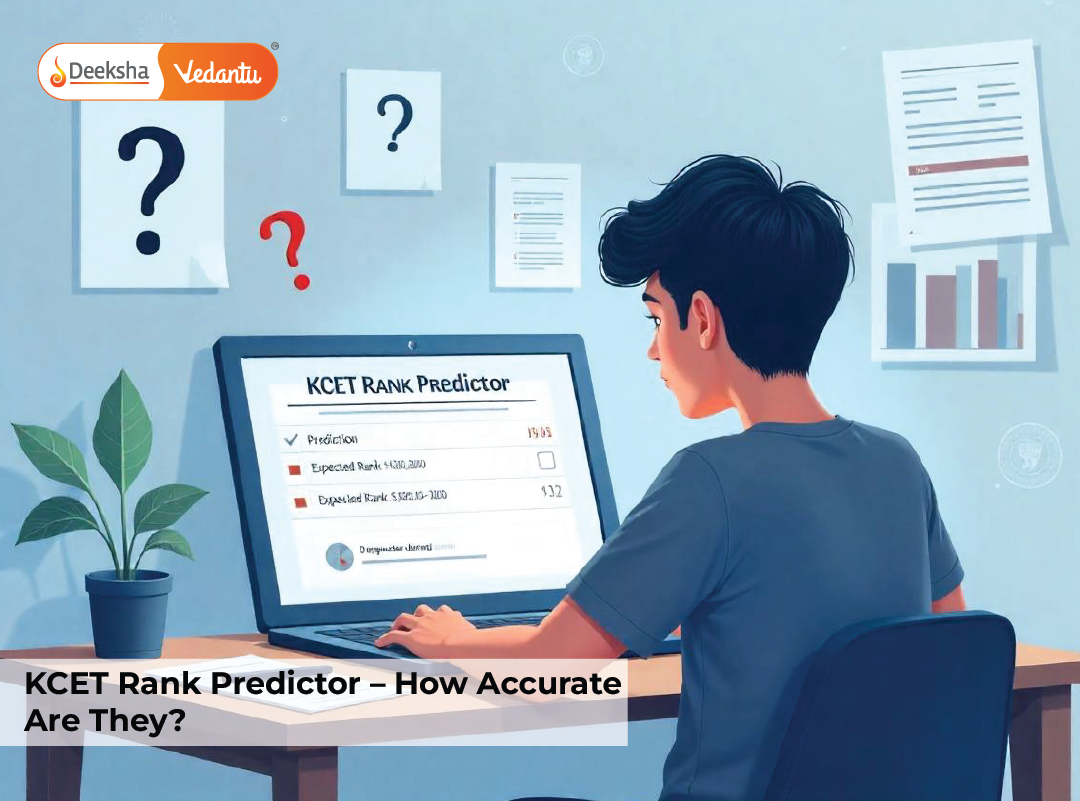After writing the KCET exam, most students rush to estimate their rank using online rank predictor tools. These tools promise quick insights into where you stand and which colleges you can target. But how accurate are they really? Can they be trusted for making critical counselling decisions?
In this blog, we’ll explore how KCET rank predictors work, what factors affect their accuracy, and how to use them wisely as part of your overall preparation and planning.
What Is a KCET Rank Predictor Tool?
Purpose and How It Works
A KCET rank predictor is an online tool designed to estimate your rank based on your expected exam marks. It uses historical data and algorithms to predict your possible All India Rank (AIR) or state rank before the official results are released.
These tools typically ask you to enter:
- Your expected marks in Physics, Chemistry, and Mathematics
- Your Class 12 board marks (if applicable for calculation)
- Your category and reservation status (GM, OBC, SC, ST, etc.)
Data Inputs: Marks vs Rank
Some tools use raw KCET scores, while others combine board scores and KCET marks (especially for engineering rank). The final predicted rank is shown based on previous year trends and input weightage.
How Students Use It After the Exam
Students often use rank predictors immediately after the exam to:
- Get an idea of their expected rank
- Shortlist possible colleges
- Plan for counselling and backup options
While helpful, these tools are only as accurate as the data and assumptions behind them.
How Rank Predictors Estimate Your KCET Rank
Based on Previous Year Trends and Closing Ranks
Most rank predictors rely on past year’s data, including:
- KCET cut-off ranks for different colleges and branches
- Exam difficulty trends
- Average performance of students
This data helps the tool simulate what your rank might be in a similar scenario.
Normalisation and Subject Weightage
KCET ranks for engineering are calculated as follows:
- 50% weightage from KCET score
- 50% weightage from Class 12 board marks (in PCM)
Many predictors factor this in. If you ignore board marks, the prediction will be skewed. This is why entering accurate board performance is essential.
Error Margins in Predictions
Even the best tools can’t guarantee precision. Error margins can range from:
- ±500 ranks for top scorers
- ±1,000–2,000 ranks for mid-range scorers
- ±3,000+ ranks if board marks are not considered
These tools provide an approximation—not a final rank.
Factors That Affect Prediction Accuracy
Annual Variation in Difficulty Level
Every year, the difficulty level of KCET papers fluctuates. A slightly tougher paper can drop average scores, impacting the rank-vs-score distribution.
Rank predictors can’t account for this shift until official results or expert analysis is available.
Cut-off Changes Based on Seat Matrix
Seats in colleges may increase or decrease each year. New colleges may be added. These changes affect the cut-off rank for each course and college. Most predictors use previous seat matrix data, so new changes reduce accuracy.
Reservation and Category Influence
Cut-off ranks for reserved categories vary each year based on competition and policy changes. If the predictor doesn’t factor in your category correctly, your estimated rank may be misleading.
How to Use Rank Predictors Wisely
Set Realistic Expectations for Counselling
Use the predicted rank to understand your admission chances. It can guide your expectations, but don’t treat it as an exact outcome. Always prepare for a possible variation.
Identify Possible Colleges for Your Range
Use the output to shortlist 10–15 colleges where your expected rank falls within last year’s closing ranks. Make a list of dream, realistic, and backup options for each round of counselling.
Avoid Overdependence on Early Predictions
Don’t panic or get overconfident based on the rank predictor alone. Many factors influence your final rank, including:
- Normalisation policies
- Final board mark submission
- KEA decisions during counselling
Always wait for official ranks before locking important decisions.
How Deeksha Vedantu Helps You Predict and Improve Your Rank
In-House Rank Predictors Based on Internal Tests
At Deeksha Vedantu, students take regular KCET mock tests. Each test comes with an internal rank prediction based on past performance and batch averages. This offers realistic insight far before the real exam.
Post-Exam Analysis Sessions
After KCET, Deeksha Vedantu conducts post-exam analysis sessions where students receive:
- Score estimation guidance
- Rank range projections
- College admission scenarios based on category
This ensures that students aren’t just relying on generic online tools.
Counselling Guidance Based on Actual Performance
Once the results are out, our mentors help students with:
- College preference selection
- Category-wise chances in government/private seats
- Strategic planning for Round 1, 2, and extended rounds
This combination of data + experience ensures higher accuracy and confidence.
FAQs
1. Are KCET rank predictors 100% accurate?
No, they are only estimates based on past trends. They cannot guarantee the exact rank due to variables like paper difficulty and board score normalisation.
2. Should I use more than one rank predictor?
Yes, using 2–3 reputable predictors can give you an average range. Don’t depend on just one tool. Cross-verifying helps set more balanced expectations.
3. Do rank predictors consider my board marks?
The good ones do. Since KCET engineering ranks include 50% board marks, any prediction without board data is likely to be inaccurate.
4. Can I plan my counselling options based on predicted rank?
You can use predicted ranks for rough planning. But final decisions like locking colleges should only be made after official ranks are released by KEA.
5. How does Deeksha Vedantu help with rank prediction?
Deeksha Vedantu uses mock test performance, historical analytics, and expert mentorship to predict rank ranges and guide students with college options and counselling strategy.
Conclusion
KCET rank predictors can be helpful tools—but they are not foolproof. Their accuracy depends on various factors like exam difficulty, seat matrix, and your board performance. Use them as a guide, not a guarantee. Always keep a margin for variation, and wait for official ranks before making final decisions.
At Deeksha Vedantu, we provide students with structured preparation, performance tracking, and personalised post-exam mentoring. With the right preparation and guidance, you won’t need to rely only on rank predictors—you’ll be ready for the real results.
Table of Contents










Get Social